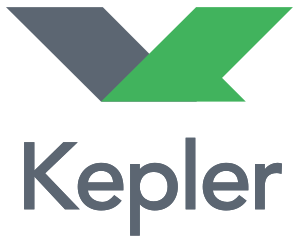07
Mar
2021
Student Guild President Callixte Kagabo reflects on leadership, the Kepler community, and pandemic adjustments. “We are always here for students.”
“I guess there are three things that got me interested in Kepler,” Callixte reflects. “The first was the level of education: it’s an international degree from an internationally accredited university. Next was the student loan, which allows me to study in a ‘cool mood,’ not stressed over finances. And finally, I had friends who studied at Kepler, telling me ‘this is the best university you’re going to find!’ The community is chill, the activities and workshops are interesting, you meet and network with successful people, and employment rates are high.”

Meet Callixte Kagabo. He’s passionate about Kepler’s mission and its community, and that’s how he found himself drawn to serve in leadership positions. Currently, Callixte is the 2021 Student Guild President, and he shared his reflections on leadership, the Kepler community, and pandemic adjustments with us.
“I don’t work alone. I work with a big committee, and my first responsibility is to ensure the effectiveness of the committee. Are representatives doing their tasks well? Are we getting the information we need?” Callixte is explaining the roles and responsibilities of the Student Guild and its President. “Next, a general task for the committee is to advocate for the students, but I personally take big responsibility there. We are a diverse community, and I need to make decisions fair for everyone, and report special cases when decisions are not fair. And third, I act as a bridge, ensuring the student body and senior management work together. Students’ concerns need to reach senior management, and I help senior management survey students’ needs and receptiveness.”
“Everything we do as a committee involves gathering information. If senior management asks my opinion on a certain strategy, I don’t give my personal opinion. I talk to students. I identify their key points and report that.”
Of course, Callixte, his team, and his classmates are facing an unprecedented situation. COVID-19 has led to school closures globally and restrictions on movement and resources.

“My leadership came in a difficult time,” Callixte nods. “The pandemic affected us in many ways, whether academically, socially, or financially. Before, the only thing we had to worry about was studying. We had access to school facilities, extracurricular activities, workshops, and many other things. You would go to campus, study, return to the dorms, and sleep. Internet access, food, everything was simple.” Now, students may face rent and food payments, unreliable access to internet and electricity, diverse living situations, and time-consuming chores around the house. Students’ entire schedules have shifted to work around these new and sometimes unpredictable factors. “I remember one student who reached out to me with a special case last year. He said, ‘to charge my computer, I have to go to the center and pay.’ So in the time other students spent studying, he waited for the laptop to be fully charged, and only then could he start.”
Reconnaissance has also become more difficult for the Student Guild. “We need information for almost 300 students, and we’re doing it virtually: we’re sharing information on WhatsApp groups, Instagram chats, Hangouts … And those who don’t have reliable internet access — or even changed their phone numbers to new country codes — aren’t going to participate in the discussion. You know, when you’re with people face-to-face, it’s easy to collect information. You may notice someone missing from class for a few days, and ask his best friend for help. But online, you’re waiting for the instructor to notify you. We may not notice if some people aren’t speaking out.” Callixte and other student representatives are getting creative and working twice as hard to stay in touch with their student constituents.
Callixte rates Kepler’s transition to a fully remote learning environment a 9 out of 10. “There’s always room for improvement, but Kepler didn’t halt any academic service being provided. The only difference is that now, instead of meeting in-person, we meet over Google or Zoom. Kepler said, ‘We’ll keep studying, and if you face problems, here’s your assigned advisor and phone number. Call him, ask for a meeting, and he’ll help with your challenge.’ Kepler is still helping us to progress; since the pandemic started, I was able to finish two levels of my studies.”

There are some silver linings to pandemic learning, though. “Personally, I’ve found some benefits to our new learning environment. When you’re working remotely and manage your time, it’s easier to engage in other activities. I enrolled in different short courses. You also learn new social skills: how to interact with the people around you, and how to adapt to a new situation. In class they teach values like flexibility, and now we’re applying it. I’ve also learned how to set limits and plan for something unexpected in my time and resources. And finally, Rwandan students have learned how to study virtually, something many never did before. So, the pandemic impacts weren’t all negative.”
Overall, Callixte is excited about his last year at Kepler, even if the “taste” has changed. “We just have to make a few adjustments. And I really enjoy being president. I love leadership and playing a role in developing a community, so I’m more excited than ever.”
“I have big goals! I want to bring the Kepler community together, so that people feel at home and invested in Kepler again. And I want to encourage those students with special cases that need help to come back to studying.”
“Kepler will always put the wellbeing of its students first. It’s a priority. The committee is working, advocating for student interests, so that senior management understands how we students feel. I want students to adapt and be innovative in dealing with this new situation. I wish them the best in working hard on their academics and responsibilities. And finally, students should know that we are always here for them. Reach out with any ideas on how to make our community better!”

